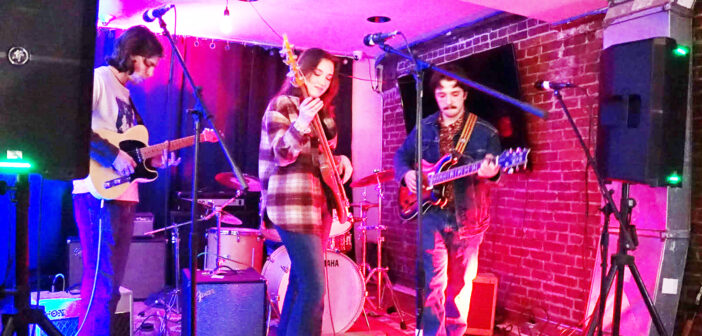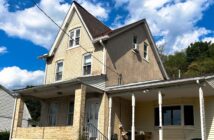According to the National Endowment for the Arts, arts and culture contributed $876.7 billion, or 4.2%, to the national Gross Domestic Product in 2020. However, between 2019 and 2020, the U.S. arts economy shrank at nearly twice the rate of the economy as a whole: arts and cultural production fell by 6.4% when adjusted for inflation.
South Bethlehem’s local music scene didn’t feel this impact, according to local musician Erik Santana.
COVID-19’s quarantine restrictions led people to learn music and invest their time in the arts, which he said has now allowed the Bethlehem music scene to “boom” post-pandemic.
Santana said there has been an uptick of young people forming bands and writing interesting, original music post-pandemic. He said this is refreshing because cover bands dominated the scene before the pandemic.
The music scene in the Southside has grown into an interwoven community featuring locally-made music at locally-operated venues.
Santana credits some of the emerging new talent to YouTube, which he said has made learning how to play instruments more accessible, especially during quarantine.
He said many people in the music scene knows each other from playing shows together or working on each other’s projects.
“I also feel like discovering a band in a live situation is f—— cool,” said Santana. “Like, you walk into a bar, and you can’t predict what they’re gonna do, you have no idea, right? They’re just kind of playing something you’ve never heard before and you just get that pure energy of music, you know, happening in front of you.”
Chris Reject, who books events for National Sokols Bethlehem, said the history of Lehigh Valley’s DIY scene is intertwined with Bethlehem’s blue-collar, steelworker history. He said it’s the “rough and tumble” spirit leading people to want to set up shows themselves, rather than partnering with larger venues, like ArtsQuest.
Reject said Sokols started as a Key Club in the early 1900s and has now turned into a local music venue and membership bar.
He described the Pennsylvania Key Clubs began dying after legalized gambling was pushed through the state legislature. Reject said Sokols was going through this same process as their membership was dwindling before it was discovered by a younger, cooler demographic.
Although still a key club, the second floor is used for local music performances.
“The first people to discover it were like the local skate rat kids, like Homebase,” said Reject. “They figured out that it was a cool, low-key place to go and they sort of infiltrated it and started joining there. I think Homebase did a video screening there, like a skate tape, and then they started letting us do shows with bands upstairs.”
Reject said the bands that perform at Sokols come from all over, but typically he tries to get a band from New Jersey, a band from Philadelphia and then two local bands. However, he said he’ll sometimes get an opportunity to book national-level bands, like Pissed Jeans, who are too big to play at Sokols’ 150-person venue.
Santana said another strength of the music scene in Bethlehem is Shards Recording Studio, which is a local recording studio that allows bands to record an album for less money than other nearby studios, making music production more affordable.
“I feel like that sort of spawned a lot of really good stuff right here, you know, because it just kind of, made a scene happen,” said Santana.
Ryan Susko, who does event booking at the Flying V, said the restaurant is trying to book a show there every week.
Susko said to accomplish this, the Flying V has been inviting people from all over Pennsylvania, like Easton, Philadelphia and State College.
Galen Deery, one of the musicians who performed at the Flying V, said in the Lehigh Valley there is a mix of up-and-coming artists, some that will end up going national, while others stay localized.
“I think the vibe, you know, of people that come out to see live music is always really positive and people get really excited about the music,” said Deery.
Ice House is another venue in Bethlehem that hosts local live music. Doug Roysdon, the program director, said the music performed at the venue is chosen by committees made up of local musicians and artists.
Roysdon said Ice House is a nonprofit organization with a mission to grow the future arts community investment by supporting the growth of local artists in Bethlehem.
“Artists focus on whether they believe in their art rather than focusing on the money aspect of it first,” said Roysdon.
Susko is also on the committee that books Ice House’s punk and DIY shows.
He said they try to make Ice House a community space where all proceeds go back to bands, because it can be hard as an artist to find a space where you’re paid well for the effort you put in.
“There’s a lot of the cool s— that other places have (in the Lehigh Valley),” said Reject, “It’s just less concentrated and you have to sort of know where to look for it.”






Comment policy
Comments posted to The Brown and White website are reviewed by a moderator before being approved. Incendiary speech or harassing language, including comments targeted at individuals, may be deemed unacceptable and not published. Spam and other soliciting will also be declined.
The Brown and White also reserves the right to not publish entirely anonymous comments.